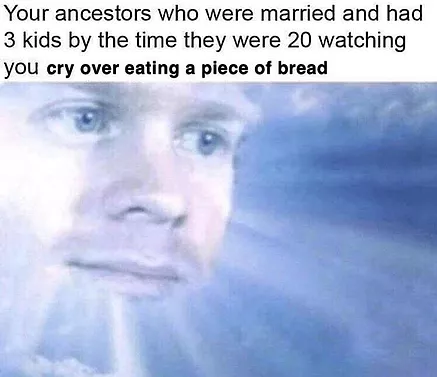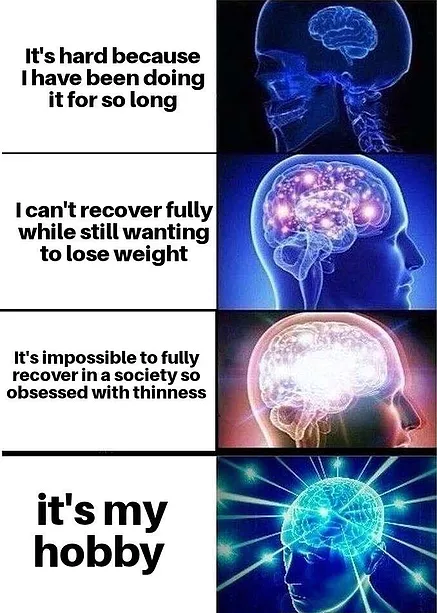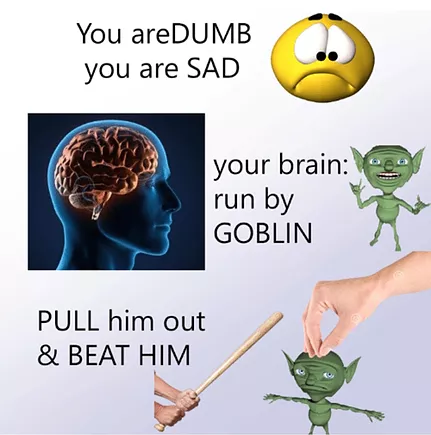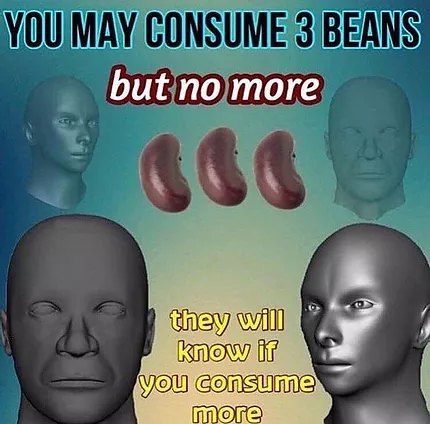EAT THE RICH
ZM
PSA: I need to start this text off with a very sincere and serious trigger warning/content warning. This text discusses anorexia & disordered eating in a kind of systematic detail. If this will affect you, please do not read this, it’s not that good to make it worth that lmao. If you’re affected by this, if this is you too, please seek medical help. Even though this text reads like the worst parts of myself, I am currently receiving treatment in the form of talking therapy, and it has been the best way for me to attempt resolution of any remaining issues. I thought I had fixed it on my own, and though you sometimes can, it leaves you vulnerable to closing the gap with unhealthy coping mechanisms. You are deserving of recovery, you are not this disorder, please recover.
Ngl, it feels trite and pointless in big big 2020 to say: ‘Food is political’. We all know this, we didn’t even really need to be told. For anyone with any kind of life that could be lived outside of the West and its parameters, food has always <been> political. But still, I can’t stop thinking about it: food as political agent, tool & object. I think I’ve realised that not only is food political, but so is its absence. If food is political, then so is hunger. If food is social, then so is hunger. If food is ascension and aesthetic experience; or narrative, a story we wrap around ourselves; then so is hunger.
Not to brag, but when it comes to food, I have a very specific skillset. I can, with astonishing precision and accuracy, eyeball almost exactly 100g of rice. I am bored by the idea of talking about my relationship with eating and its disorder in a public way like this, where you’re all under the stodgy monolith of ~reader~ and I don’t want anything from you, but it’s impossible for me to write this without also navigating (or maybe j stating) my own proximity to it.
Hunger and food are political because bodies are political; eating disorders rest at the complex, fertile and pulsating intersection of so many sociological categories. Anorexia is an opaque condition, it always rests behind a veil or a mask; of poor body image, dysmorphia and dysphoria (both, as twin states for some), hyperactivity and busy-ness, of pickiness, sensory disgust, of active refusal, ethical denial, power, control in restriction, purity and the moralism of ~clean eating~, or the inertia of depression. It is all of these things and simultaneously none of them; it flattens them, refracts them and uses them as a vessel. For me, it has been a few of those, never necessarily just one at a time. Sometimes, they overlap and combine into a new form: disgust but make it at the smell, disgust but at the idea of being able to feel your body, disgust but make it at the idea of being IN a body. The closest I have ever seen someone get to a true identification of it is Chris Kraus’ <Aliens and Anorexia>. A few years ago I wrote that that book gave me the vocabulary with which to articulate my experience, an ability to feel closer to the root of something that had alienated me from my own body. But I think I have been unable, for a long time, to articulate what that experience was precisely, because there was a larger, louder stutter around food itself & its absence - rather than around the body.
In <Aliens and Anorexia>, Chris Kraus writes about the philosopher Simone Weil, the artist Paul Thek, herself and the process/failure of making a film (Gravity & Grace). It documents these sometimes distant things, underpinning them as bound by a kind of liminality or separation from convergence into acceptability. For me, the parts I clung to and remember most vividly, are the parts that centre in on Weil, food, cynicism and desire. She writes about anorexia as a destruction of the ‘i’, ‘an active ontological state’, and an attempt to ‘step outside [the] body’. In pinning it down as a kind of transcendence that is part of the process of philosophical enquiry, Kraus manages to examine it as something almost entirely internal & mental // and simultaneously // something that entirely transcends the subjecthood of its bearer, entering into ‘a psychic, intellectual equation between a culture’s food and the entire social order.’ It might read kinda tritely now (or to anyone else who has a history of disordered eating practices) but Kraus writes: ‘Has it ever occurred to you that food's intensely social?’ I mean, yes, babe yes it has, but she continues, ‘There is just so much to think about before you eat. The origins of food, the social politics of its production. Its presentation. The presence or absence of true happiness. In its journey to the table, was this food handled by anyone who cared or understood it? None of these circumstances can be the least bit alienating in order for food to taste good… The entire history of gourmandaise is a history of positing utopia.’ The sociability of food is tied up beyond the (inter)personal - moments of sharing and feeding as intimacy - it’s glued to the politics of social production and labour, workers rights, immigration, logistics and emissions; the possibility of a utopia. Do you remember the courgette crisis in 2017? Food exists beyond the happy stories we tell ourselves about its personal importance, it exists in a global distribution system, and as soon as I felt the edges of that, it sickened me all over again. Disgust is more powerful than desire, that is how it is useful in dismantling, or more, breaking it.
In <Eat Up>, a book n manifesto for eating with pleasure, Ruby Tandoh writes about Judee Sill, a folk singer-songwriter, and the undercurrent of hunger that runs through her album, <Heart Food>. ‘When Judee Sill sings about the gap between her spirit and her body, and the hunger that seeps between, it isn’t some dream of a bodiless existence. Sill doesn’t want to let go of her earthly roots, or the unavoidable hunger that we feel as human beings: she feels every last pang of that hunger, and she cherishes it. The wonderful thing about allowing yourself to feel your hunger - whether that’s the hunger that Sill sung about, or a more physical gurgling - [raging] in my guts - is that it reminds you of the distance between where you are, and where you want to be. When you say ‘I am hungry’, you might think you’re just talking about wanting another pack of Malteasers, but what you’re really saying is that you’re alive, and that you want more, and that there’s no pleasing your soul until your body has been appeased. You are myth, intestine, splendour, fart, divinity and heaviness all at once.’ Ruby echoes and continues on from Chris Kraus’ assertion that anorexia is ‘an active ontological state’, it is a lean into that hunger between body & soul, a duality as you are able to hold on to both: viscerally, feral-y in your body, experiencing every inch of it - from your stomach and its hyper presence to your hands and feet as they go cold and tingly // and also // kind of not there at all, starving as a kind of astral projection outside of your body, a consideration of your second body - that Daisy Hildyard writes about, the one that is an expanding, stretching embodiment of the affect of your first body - and a kind of transcendence as your mind fogs. This might sound like I’m now writing a manifesto for anorexia itself, but maybe, potentially, in hunger it is possible to find a kind of valid and intense aesthetic and embodied experience - one that is similar to and potentially better than any artwork I gush about week in and out.
Because equally, when you’re in recovery you learn how to eat all over again. The same way that babies trying lemons for the first time do that face, with sheer total shock, you do that at the taste of buttery toast when you haven’t had bread (or butter tbh) in 3 years. That’s amplified when it has a significant weight; I remember the first time I had one of my Dadi’s onion bhajis after not eating/keeping down anything over 200kcals for years and I cried - I remember standing in her kitchen, towering over her as she taught me how to make them, actively de-escalating every catastrophic feeling of panic as she poured chickpea flour into the bowl. It is a shiny new kind of panic, not of disgust or horror at your body or the idea of eating - but at what you’ve become, of knowing that you’re at the harsh end of something you can’t help. Rather than adjusting your eating habits back to ~normality~, recovery is the process of attuning to and relearning your body’s needs and wants, of being able to differentiate between the two, and of removing the moralistic urge to identify want as a bad thing. It is learning to base your sense of enough on something inside yourself rather than something external (portion size, calories, what you think you deserve, what you feel will be acceptable). Anorexia represents a byproduct of an already ruined relationship with food and your internal bodily cues - if you have been through a lifetime of conditioning that invalidates your internally guided limits, cues and measures, if the world at large tells you that the way you experience things isn’t the way it really is, it feels like a short (or related) jump. It shares the fundamental baseline, beyond the body, with what we deem trustworthy. Because the alienation of the disorder isn’t just from your body and its responses, from internal feeling it jumps to intuited systems of knowledge, it is deeply tied to capitalism’s alienation of your own specific humanity - the metaphysical and existential as well as the social, historic imaginaries. Maybe it’s actually the other way round? Either way, body and humanity leak into one another. When your body becomes jarg, loses any kind of significant meaning beyond that which is assigned to it by the machine of capital and production, it represents that exact alienation that Marx wrote about. When Chris Kraus writes that ‘the entire history of gourmandaise is a history of positing utopia’, it is recognisable in this tbqh unironic(!) Marxist framework as a spectre and image, elicits disgust as performance and construction. It becomes the pursuit of a perfection that doesn’t exist, and ends in disgust at the point of inauthenticity. Denial is the reclamation of control within that exchange, a tight logic that is assimilable and whole.
Hunger is political, it has historicity in its deployment (consensually and as an enforced state & tool of external violence). My Dada lived through the Bengal famine, experienced and witnessed hunger as a tool of purposeful colonial violence. My Mum’s Dadi was Jain, she only cooked with 5 ingredients to feed herself, these 5 ingredients included the water she boiled rice in, the salt to season; restriction was a signifier and an action tied to her religion and the implications of caste, restriction was a kind of function of privilege. Outside of my own proximity, Mayukh Sen wrote about the history of restriction and innovation in what Hindu-Bengali widows would eat. There are now more food banks than there are branches of McDonald’s in the UK, people are dying waiting for Universal Credit, autopsies are finding their stomachs empty. Hunger is a loaded, leaking signifier. It is important for me to differentiate the way I experienced it, as an actively sought choice, is different to its deployment by the state, by socio-political structures like caste and the violence that can represent. Anorexics are not victims of their own system, we are not flattened under societal messaging that pretty privilege is worth the mortality rates (although it is definitely a mask that this disease can function and flourish behind). This is a real and tangible grasp at power in a world that denies it, refuses to assign it to certain people. There is something real, measurable and weirdly enough, stable in this mad scramble. The alienation and then eventual reclamation makes sense, it is a tight inscrutable logic that can’t be punctured without an equally solid reasoning.
For what it’s worth, and to partially stop this from sounding like a literal anorexic’s manifesto, Ruby Tandoh is a powerful advocate of using eating to reaffirm the body’s presence, to recouple yourself with it when presented with that alienated trip. ‘I have felt this myself, caught in that moment of discord between the raging and screaming of my soul and the gentleness of carefully nestling dumplings into a pot of steaming stew. I’ve even spoken to the dumplings in my madness. But that moment of strange caring is enough… When everything feels hopeless, it’s a reminder that there are real things in your life, things that are tangible and meaningful…I feel anchored again, like I belong in my body and my body belongs in this world, when I make something with this care. The dumplings balloon from pallid little balls to fat, steaming, glorious clouds, their bottoms sodden with savoury stew. They’re as hot and heavy and beautiful as little babies’. There is the capacity for joy, as well as rapid thoughtless movement and the exit from feeling that it represents. I am aware that this text reads in a specific way, I’m aware that I sound ill. I think I probably still am, because while I can read Ruby’s words above and know that they have been true to me recently, I also know that I probably only truly enjoy a meal in this way like… once a week max. Meals for myself are private, invisible, demure, small and not made to elicit this kind of joy. For me, still, enjoyment and pleasure in food is intensely social. I am writing this now, even though I still sound ill, because I think that’s the point. This instability is exciting, it is addictive, you trip out on the power and the rush in feeling like you’ve cheated something. It’s truly thrilling, I’ve never felt more alive than when I was literally killing myself. The framing of it as an active ontological state is the closest description, you cannot imagine what it feels like to be the site of so many active abstract and corporeal collisions in simultaneity.
In pulling together this active ontological state - of being in and out of the body, of being deeply individually affirmed and only part of an externality, body as immutable given and liquid site of transformation and visible affect - anorexia is literally fucking dialectical method. It is a point in the in-between, constant instability but resolution in the wave of it, in the realisation that in collision, energy and life emerges. Chris Kraus writes that ‘anorexia is a violent breaking of the chain of desire’; ‘food [is] a disembodied signifier’, and anorexia proposes a dangerous denial and acceptance (both) of that. In our political readings of food, we must include both the system that it exists in and the way it converges, collides with and is interdependent upon: hunger. When Kim K showed us around her weird kitchen and walk-in fridge with frozen yoghurt machine & all, almost everyone quote tweeted it saying ‘eat the rich’. Food is a disembodied signifier, yes, but it is also a proxy for bodies, an extension for them to leak into, a totemic vessel for their transference. Chris Kraus breaking the seal on anorexia as a ‘psychic, intellectual equation between a culture’s food and the entire social order’ goes beyond her analysis in Aliens & Anorexia - - of it being tied to alienation and a leaking cynicism. It is capital P Political. Food is capable of absorbing the psychic debt of a body - of taking their societal baggages up into itself - it’s capable of being a signifier of class, caste, social capital/access, gender ofc!, as well as race. As it is capable of representing the oppression and violence that is enacted upon those axes, it is capable of being the means of that oppression and violence; it is capable too of instigating that violence, of being object, tool and agent on this sliding scale of epistemologic violence. Hunger and anorexia provide a system of denying and simultaneously affirming the subjectivity that informs these signifiers. Kim’s fridge; orange oil floating in blobs on top of a curry; courgette crisis; exactly 100g of rice in a small bowl eaten with a teaspoon; frozen yoghurt machine; bread & roses; I wonder if Marx ever skipped meals to feel a furious kind of ragged aliveness. Though food itself is a ‘disembodied signifier’, it is tied, bound, tethered permanently to a body and all the complicated stickiness that accompanies it.




